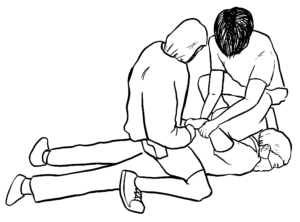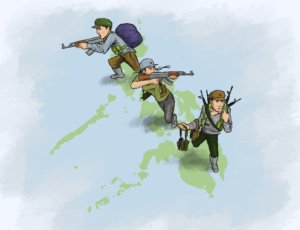50-year advances of the revolutionary women's movement

It is a stellar victory not only for women but for the entire revolutionary movement that the Makabayang Kilusan ng Bagong Kababaihan (Makibaka) has persevered in 50 years of revolutionary struggle to change the system which has oppressed and impoverished women.
Through five decades, it firmly upheld the view that the ruling class political authority forms the backbone of other authority systems which oppress and exploit women, and that it should be smashed to attain genuine women’s liberation. This takes primary form in women’s participation in the armed struggle for national democracy.
Makibaka spearheads in shattering feudal and bourgeois culture and ideas that see women as weak, house-bound or as private property. It paves the way for women to participate in the struggle for societal change. Tens of thousands of activist and revolutionary women arose from factories, communities, campuses and farms.
Makibaka emerged and was launched in 1970, and was founded formally on March 18, 1972 after its first congress on March 11-12 in Sampaloc University Center. The congress clarified that the key to women’s liberation is its active participation in the national democratic revolution. It adapted the name “Makabayan” to replace the original “Malaya,” to emphasize this point.
Makibaka’s history is marked by its role during the First Quarter Storm and its opposition to martial law. It was at the historical Diliman Commune. It spearheaded protests against the Bb. Pilipinas pageant which commodified women. They also participated in the US Tobacco Corporation strike. Women worker activists emerged including Liza Balando from Rossini’s Knitwear who was killed by fascist soldiers during a protest action on May 1, 1972.
When martial law was imposed in 1972, women joined the New People’s Army in the countryside, including Lorena Barros, Makibaka’s first president. Makibaka persevered in publishing Malayang Pilipina. Its members were among the first organizers of sakadas in Western Visayas and participated in agrarian revolution in other parts of the country. It also established chapters in Mindanao. It recruited members in Davao campuses and in communities in Ozamis, Pagadian and Dipolog. It was among the founding organizations of the National Democratic Front of the Philippines in 1973.
Persistence in organizing and struggles during the first years under martial paved the way for mass struggles, culminating in 1983-1986 giant rallies until the fascist Marcos dictatorship was ousted. Makibaka rapidly expanded its membership during this time.
Makibaka persevered in advancing the Filipino women’s struggle in the framework of the national-democratic struggle. It has strengthened its underground movement amid the difficult and dangerous situation marked by the US-Duterte regime’s attacks. During the regime’s fascist lockdown and restrictions since 2020, communities with Makibaka chapters served as sanctuaries of the underground forces.
Makibaka members are determined to arouse, organize and mobilize women in the countryside and cities. “Intense dedication and hard work is needed to convince the masses for the need to unite and struggle,” an organizer said.
Last January, Duterte declared Makibaka as a “terrorist organization.” Makibaka said this “apes his idol Marcos Sr,”—to terror-tag the revolutionary movement to justify his wicked plans.
Makibaka is aware that the reactionary elections is dominated by the ruling class, but recognizes as well the fervent desire of people and women to remove the oppressive and fascist Duterte regime from power. Makibaka takes it as a challenge to mobilize women to defeat the Marcos-Duterte tandem.
The need for a radical social change remains and has only become more imperative. Women will continue to uphold the need for people’s democratic revolution. The revolutionary women’s movement is ready to face all challenges.
It will continue to expand and consolidate, and periodically assess and sum-up its experiences to overcome weaknesses and errors, draw lessons and advance its struggles.



